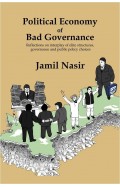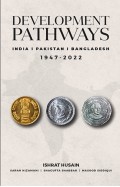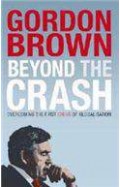- Home
- Books
- Categories
- Non Fiction
- Business & Management
- Business & Finance
- Syntax of Sales Tax on Services
Syntax of Sales Tax on Services
By: Asfandyar Khan Tareen
-
Rs 1,125.00
- Rs 2,500.00
- 55%
You save Rs 1,375.00.
Due to constant currency fluctuation, prices are subject to change with or without notice.
What is
sales tax on services? Who has the legislative competence over sales tax on
services after the Eighteenth Amendment? How is the Constitution expounded? Why
are the tax entries of a written Constitution separate from general entries? Is
liberal interpretation of legislative entries even possible after the
Eighteenth Amendment? How are the questions of distribution of legislative
powers dealt with in other countries like USA, Australia, Canada and India? What
tests are employed by the judges in differentiating between a good and a
service? What are the territorial limitations of a provincial tax? Is it
constitutionally permissible for a provincial tax like sales tax on services to
extend its statutory jurisdiction on federal corporations and instrumentalities
performing sovereign functions of the State? How should or should not the
powers be delegated?
What
are the broad principles of judicial review in relation to vires of statute and
administrative actions? What are judicial and, quasi-judicial powers? What is
the importance of due process and natural justice in assessment proceedings? What
are the basic ingredients of a valid show- cause notice and a speaking order?
Is res judicata applicable to the departmental proceedings? Is it possible to
compute tax on presumptions and average sales? What are the recovery powers available
with a tax officer? What are the canons for interpretation of tax laws?
This
handbook is a pioneer writing on sales tax on services in Pakistan, through
which a unique attempt has been made in lucidly answering the above questions
with a clear mind and succinct expression to illuminate the understanding of
the readers about this evolving tax and its propositions with crisp
discussions, supported by hundreds of reported cases (national and international).
Without appreciating the syntax of sales tax on services in our written
Constitution, the justice to the subject could not have been possible. It is
for this reason that this handbook devotes its focus on Constitutional, Tax and
Administrative law so that the judges, practitioners, officers, students and
taxpayers can derive assistance from this carefully written and all-encompassing
treatise.
What is
sales tax on services? Who has the legislative competence over sales tax on
services after the Eighteenth Amendment? How is the Constitution expounded? Why
are the tax entries of a written Constitution separate from general entries? Is
liberal interpretation of legislative entries even possible after the
Eighteenth Amendment? How are the questions of distribution of legislative
powers dealt with in other countries like USA, Australia, Canada and India? What
tests are employed by the judges in differentiating between a good and a
service? What are the territorial limitations of a provincial tax? Is it
constitutionally permissible for a provincial tax like sales tax on services to
extend its statutory jurisdiction on federal corporations and instrumentalities
performing sovereign functions of the State? How should or should not the
powers be delegated?
What
are the broad principles of judicial review in relation to vires of statute and
administrative actions? What are judicial and, quasi-judicial powers? What is
the importance of due process and natural justice in assessment proceedings? What
are the basic ingredients of a valid show- cause notice and a speaking order?
Is res judicata applicable to the departmental proceedings? Is it possible to
compute tax on presumptions and average sales? What are the recovery powers available
with a tax officer? What are the canons for interpretation of tax laws?
This
handbook is a pioneer writing on sales tax on services in Pakistan, through
which a unique attempt has been made in lucidly answering the above questions
with a clear mind and succinct expression to illuminate the understanding of
the readers about this evolving tax and its propositions with crisp
discussions, supported by hundreds of reported cases (national and international).
Without appreciating the syntax of sales tax on services in our written
Constitution, the justice to the subject could not have been possible. It is
for this reason that this handbook devotes its focus on Constitutional, Tax and
Administrative law so that the judges, practitioners, officers, students and
taxpayers can derive assistance from this carefully written and all-encompassing
treatise.
RULE OF LAW A HANDBOOK FOR BAR BENCH
By: Asfandyar Khan Tareen
Rs 1,125.00 Rs 1,500.00 Ex Tax :Rs 1,125.00
Syntax of Sales Tax on Services
By: Asfandyar Khan Tareen
Rs 1,125.00 Rs 2,500.00 Ex Tax :Rs 1,125.00
Zubin Mehta: A Musical Journey (An Authorized Biography)
By: VOID - Bakhtiar K. Dadabhoy
Rs 472.50 Rs 1,050.00 Ex Tax :Rs 472.50
Political Economy of Bad Governance - Reflections on Interplay of Elite Structure, Governance and Public Policy Choices
By: Jamil Nasir
Rs 1,440.00 Rs 1,600.00 Ex Tax :Rs 1,440.00
Governing the Ungovernable
By: Dr. Ishrat Husain, Sarah Nizamani, Shagufta Shabbar and Masood Siddiqui
Rs 1,345.50 Rs 1,495.00 Ex Tax :Rs 1,345.50
Development Pathways
By: Dr. Ishrat Husain, Sarah Nizamani, Shagufta Shabbar and Masood Siddiqui
Rs 3,145.50 Rs 3,495.00 Ex Tax :Rs 3,145.50
Balochistan: A Conflict of Narratives
By: Fida Hussain Malik
Rs 2,655.00 Rs 2,950.00 Ex Tax :Rs 2,655.00
Pakistan The Economy of an Elitist State
By: Dr. Ishrat Husain, Sarah Nizamani, Shagufta Shabbar and Masood Siddiqui
Rs 927.00 Rs 1,030.00 Ex Tax :Rs 927.00
The Black Swan The Impact Of The Highly Improbable
By: Nassim Nicholas Taleb
Rs 2,965.50 Rs 3,295.00 Ex Tax :Rs 2,965.50
Beyond The Crash: Overcoming The First Crisis Of Globalisation
By: Gordon Brown
Rs 355.50 Rs 395.00 Ex Tax :Rs 355.50
Reset: How This Crisis Can Restore Our Values and Renew America
By: Kurt Andersen
Rs 450.00 Rs 500.00 Ex Tax :Rs 450.00
Powershift Knowledge Wealth And Violence at the Edge of the 21st Century
By: Alvin Toffler
Rs 1,271.25 Rs 1,695.00 Ex Tax :Rs 1,271.25
High Financier: The Lives And Time Of Siegmund Warburg
By: Niall Ferguson
Rs 1,787.50 Rs 2,750.00 Ex Tax :Rs 1,787.50
Why Smart People Make Big Money Mistakes and How to Correct Them
By: Gary Belsky
Rs 627.75 Rs 1,395.00 Ex Tax :Rs 627.75
Switch: How to change things when change is hard - (PB)
By: Dan Heath
Rs 767.25 Rs 1,395.00 Ex Tax :Rs 767.25
Political Economy of Bad Governance - Reflections on Interplay of Elite Structure, Governance and Public Policy Choices
By: Jamil Nasir
Rs 1,440.00 Rs 1,600.00 Ex Tax :Rs 1,440.00
Governing the Ungovernable
By: Dr. Ishrat Husain, Sarah Nizamani, Shagufta Shabbar and Masood Siddiqui
Rs 1,345.50 Rs 1,495.00 Ex Tax :Rs 1,345.50
Development Pathways
By: Dr. Ishrat Husain, Sarah Nizamani, Shagufta Shabbar and Masood Siddiqui
Rs 3,145.50 Rs 3,495.00 Ex Tax :Rs 3,145.50
Balochistan: A Conflict of Narratives
By: Fida Hussain Malik
Rs 2,655.00 Rs 2,950.00 Ex Tax :Rs 2,655.00
Pakistan The Economy of an Elitist State
By: Dr. Ishrat Husain, Sarah Nizamani, Shagufta Shabbar and Masood Siddiqui
Rs 927.00 Rs 1,030.00 Ex Tax :Rs 927.00
No recently viewed books available at the moment.
Zubin Mehta: A Musical Journey (An Authorized Biography)
By: VOID - Bakhtiar K. Dadabhoy
Rs 472.50 Rs 1,050.00 Ex Tax :Rs 472.50
RULE OF LAW A HANDBOOK FOR BAR BENCH
By: Asfandyar Khan Tareen
Rs 1,125.00 Rs 1,500.00 Ex Tax :Rs 1,125.00
Syntax of Sales Tax on Services
By: Asfandyar Khan Tareen
Rs 1,125.00 Rs 2,500.00 Ex Tax :Rs 1,125.00
Political Economy of Bad Governance - Reflections on Interplay of Elite Structure, Governance and Public Policy Choices
By: Jamil Nasir
Rs 1,440.00 Rs 1,600.00 Ex Tax :Rs 1,440.00
Governing the Ungovernable
By: Dr. Ishrat Husain, Sarah Nizamani, Shagufta Shabbar and Masood Siddiqui
Rs 1,345.50 Rs 1,495.00 Ex Tax :Rs 1,345.50
Development Pathways
By: Dr. Ishrat Husain, Sarah Nizamani, Shagufta Shabbar and Masood Siddiqui
Rs 3,145.50 Rs 3,495.00 Ex Tax :Rs 3,145.50
Balochistan: A Conflict of Narratives
By: Fida Hussain Malik
Rs 2,655.00 Rs 2,950.00 Ex Tax :Rs 2,655.00
Pakistan The Economy of an Elitist State
By: Dr. Ishrat Husain, Sarah Nizamani, Shagufta Shabbar and Masood Siddiqui
Rs 927.00 Rs 1,030.00 Ex Tax :Rs 927.00












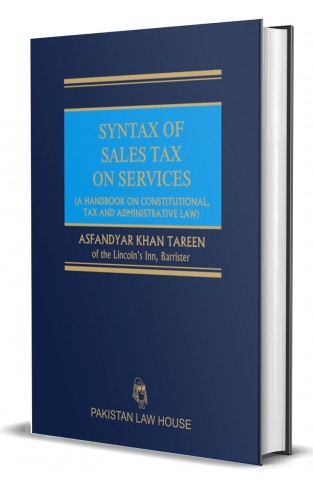
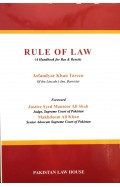
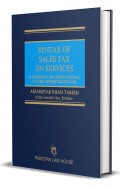
-120x187.jpg?q6)





